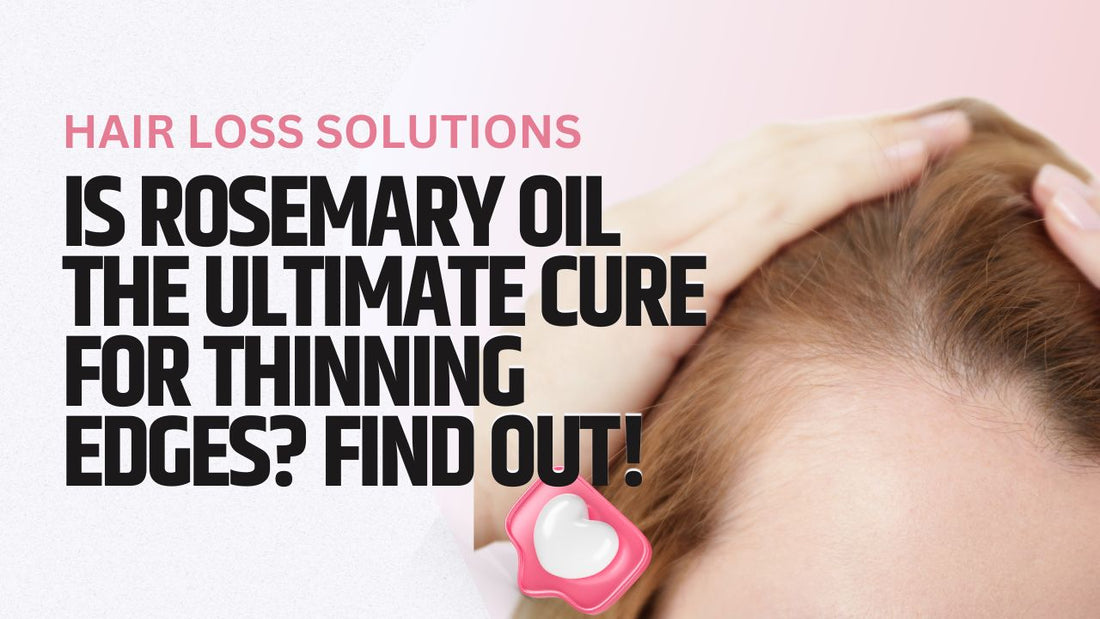
Is Rosemary Oil the Ultimate Cure for Thinning Edges? Find Out!
Share
Thinning edges can be a frustrating and confidence-denting issue for many individuals. The quest for an effective remedy has led to the spotlight on natural solutions, with Rosemary oil emerging as a potential game-changer. In this comprehensive exploration, we delve into the causes of thinning edges, discuss the scientific evidence supporting Rosemary oil, and shed light on a specialized product, the Proactive Rosemary Hair Booster Oil, which combines Rosemary oil's power with other natural ingredients to promote hair health.

Thinning edges can affect people of all ages and genders, causing concern and impacting self-esteem. The journey to find a suitable remedy often leads individuals to explore natural options, driven by the desire for safe and holistic solutions. Among these options, Rosemary oil has garnered significant attention for its potential to combat thinning edges and promote hair regrowth. In this in-depth article, we embark on a journey to understand the root causes of thinning edges, explore the scientific evidence supporting the efficacy of Rosemary oil, and introduce you to the Proactive Rosemary Hair Booster Oil, a product that encapsulates the power of Rosemary oil along with a synergistic blend of natural ingredients.

Understanding Thinning Edges
What Causes Thinning Edges?
Thinning edges, often referred to as receding hairlines, are a common issue that many people face. To effectively address this concern, it's crucial to comprehend the underlying causes. Several factors contribute to thinning edges, including:

- Excessive Styling: Constantly styling your hair with tight hairstyles like braids, weaves, or cornrows can exert excessive pressure on the hairline, leading to hair breakage.
- Tight Hairstyles: Wearing tight hairstyles for extended periods can weaken hair follicles and cause hair loss along the edges.
- Genetics: Some individuals are genetically predisposed to have thinner hair around their hairline, making them more susceptible to thinning edges.
- Hormonal Changes: Hormonal imbalances, often experienced during pregnancy, menopause, or due to medical conditions, can contribute to hair loss, including along the edges.
- Nutritional Deficiencies: A lack of essential nutrients, such as biotin, vitamin D, and iron, can weaken hair and lead to thinning edges.
- Stress and Anxiety: Chronic stress can disrupt the hair growth cycle, resulting in hair loss.
Understanding these factors helps individuals identify the root cause of their thinning edges and select appropriate remedies.
The Search for Effective Remedies
The pursuit of natural remedies for thinning edges has grown as people want safer, holistic hair care. Rosemary oil is a natural alternative to commercial products, appealing to those seeking healthier hair.

Transitioning from traditional products to natural remedies can be a significant change. Many are willing to explore this shift to improve hair health and appearance. This change is driven by the desire to reduce risks from commercial products and adopt a holistic approach. Among natural remedies, Rosemary oil is a standout option for thinning edges due to its history, science support, and versatility.
Rosemary Oil: The Miracle Elixir?
The Power of Rosemary Oil
Rosemary oil, known for centuries for its culinary and medicinal uses, has been celebrated for its hair-boosting properties. It's derived from the aromatic herb Rosemary (Rosmarinus officinalis) and has long been recognized for its multifaceted benefits. One of its standout qualities is its remarkable ability to promote hair growth and improve hair thickness.

Rosemary oil is packed with essential nutrients, including:
- Antioxidants: These protect hair follicles from damage caused by free radicals, promoting healthier and stronger hair.
- Vitamins (E and C): These vitamins enhance circulation in the scalp, which is crucial for delivering nutrients to the hair follicles.
- Iron: An essential mineral for hair health, iron helps transport oxygen to the hair roots, aiding in growth.
- Calcium: This mineral plays a role in maintaining hair structure and strength.
The combined effects of these nutrients make Rosemary oil a powerful asset in the battle against thinning edges. Its antioxidant properties help combat oxidative stress, a common contributor to hair loss, while its ability to improve blood circulation in the scalp ensures that hair follicles receive the nourishment they need for optimal growth.
Scientific Evidence
While the historical use of Rosemary oil for hair health is well-documented, modern science has also taken an interest in exploring its effectiveness. Numerous scientific studies have focused on Rosemary oil and its impact on hair growth. These studies provide compelling evidence that supports the use of Rosemary oil as a natural remedy for thinning edges.

One study published in "Skinmed" in 2015 investigated the effects of Rosemary oil on hair growth in mice. The results revealed that Rosemary oil significantly increased hair regrowth compared to a control group. This effect was credited to Rosemary oil's capacity to boost scalp microcirculation, thereby stimulating hair growth.
Another study, published in "Phytotherapy Research" in 2015, explored the efficacy of Rosemary oil in treating androgenetic alopecia, a common cause of hair loss. The study found that Rosemary oil was just as effective as minoxidil, a popular hair growth treatment, in promoting hair growth over a six-month period. This finding underscores the potential of Rosemary oil as a natural and safe alternative to conventional hair loss treatments.

These scientific findings provide a strong foundation for considering Rosemary oil as a valuable addition to your hair care routine, especially if you're dealing with thinning edges. The results of these studies, conducted under controlled conditions, demonstrate the tangible benefits of incorporating Rosemary oil into your hair care regimen.
Spotlight: Proactive Rosemary Hair Booster Oil – Elevating Your Hair Growth Journey
A Powerful Blend of Natural Ingredients
Proactive Rosemary Hair Booster Oil doesn't rely solely on Rosemary oil's potential. It combines a carefully selected blend of natural ingredients that each play a crucial role in nourishing and revitalizing hair. This synergistic blend includes:
- Grape Seed Oil: Known for its lightweight, non-greasy texture, grape seed oil is rich in vitamin E and linoleic acid. It promotes hair health and moisture retention.
- Castor Seed Oil: Renowned for strengthening hair shafts and promoting growth, castor oil is a natural conditioner that combats hair breakage.
- Ethyl-hexyl Palmitate: Enhancing the oil's texture, this ingredient ensures easy application to the scalp and hair.
- Macadamia Seed Oil: Rich in fatty acids, macadamia oil deeply nourishes hair follicles and promotes overall hair health.
- Jojoba Seed Oil: Resembling natural scalp oils, jojoba oil hydrates and balances the scalp, preventing excess oiliness.
- Lavender Oil: Lavender oil's soothing properties alleviate scalp irritation and combat stress-related hair loss.
- Ginger Root Oil: Stimulating blood circulation in the scalp, ginger root oil promotes hair growth and prevents loss.
- Tea Tree Leaf Oil: With antimicrobial properties, tea tree oil maintains a clean and healthy scalp.
- Peppermint Oil: Providing a refreshing sensation, peppermint oil stimulates hair follicles for improved growth.
- Rosemary Leaf Oil: Discussed in detail for its numerous benefits in promoting scalp health and hair growth, rosemary oil is a key component.
- Bisabolol: Derived from chamomile, bisabolol soothes the scalp and reduces irritation, creating optimal conditions for hair growth.
This carefully crafted blend of natural ingredients addresses various aspects of hair health, from nourishment and strength to growth stimulation and scalp wellness. Each ingredient is chosen for its unique contributions, ensuring that Proactive Rosemary Hair Booster Oil provides a holistic solution for individuals struggling with thinning edges.
Why Choose Proactive Rosemary Hair Booster Oil
This specialized product offers several compelling advantages that make it a standout choice for individuals seeking to combat thinning edges and improve the overall health of their hair:
- Comprehensive Solution: Proactive Rosemary Hair Booster Oil addresses multiple aspects of hair health, making it a well-rounded product for those dealing with hair loss or looking to improve the overall quality of their hair.
- Natural and Safe: The oil's ingredients are predominantly natural, minimizing the risk of adverse effects and making it suitable for regular use.
- Scientifically Formulated: Proactive Rosemary Hair Booster Oil is developed using scientific insights into hair health, ensuring its effectiveness.
- Easy Application: The oil's lightweight texture ensures easy and non-greasy application, making it comfortable for daily use.
By incorporating Proactive Rosemary Hair Booster Oil into your hair care routine, you can elevate your journey to healthier, more vibrant hair. Whether you're combatting hair loss or simply seeking to enhance the natural beauty of your locks, this product offers a holistic solution backed by the power of natural ingredients.
Using Rosemary Oil for Thinning Edges
How to Apply Rosemary Oil
Effective application of Rosemary oil is essential for achieving desired results. Follow this concise guide for best practices when using this natural remedy:
- Choose High-Quality Rosemary Oil: Begin by selecting top-quality Rosemary oil from a reputable source, ensuring it's 100% pure and free from additives.
- Dilute the Oil: Rosemary oil is potent and can irritate the skin when undiluted. Mix 2-3 drops of Rosemary oil with a carrier oil like coconut, jojoba, or olive oil. This dilution minimizes skin irritation and ensures even distribution.
- Perform a Patch Test: Before applying diluted Rosemary oil to your scalp, conduct a patch test on a small skin area to check for adverse reactions. Wait 24 hours to confirm no allergies or sensitivities.
- Cleanse Your Scalp: Begin with a clean scalp. Use a gentle shampoo to remove dirt, excess oils, and product buildup from your hair and scalp.
- Section Your Hair: For even application, divide your hair into sections, especially if it's thick or long.
- Apply the Oil: Use a dropper or your fingertips to apply the diluted Rosemary oil directly to your scalp. Gently massage it in circular motions to boost blood circulation and ensure uniform oil distribution.
- Cover Your Hair: After applying the oil, cover your hair with a shower cap or clean towel. This helps trap heat and enhances oil absorption.
- Leave it On: Let the oil sit on your scalp and hair for at least 30 minutes, or leave it overnight for better absorption.
- Rinse and Shampoo: After the recommended time, rinse your hair thoroughly with lukewarm water. Follow with a gentle, sulfate-free shampoo to remove any remaining oil.
- Repeat Regularly: For optimal results, apply Rosemary oil to your scalp regularly, ideally two to three times per week.

Comparing Rosemary Oil with Other Remedies
Rosemary Oil vs. Commercial Hair Products
To make an informed choice about addressing thinning edges, it's essential to compare Rosemary oil with commercial hair products commonly found on the market. Each option has its advantages and disadvantages.
-
Rosemary Oil:
- Advantages: Natural, safe, and effective for many users. Contains antioxidants and nutrients beneficial for hair health. Minimal risk of adverse effects.
- Disadvantages: Results may vary from person to person. Requires consistent use for noticeable improvements.
-
Commercial Hair Products:
- Advantages: Some commercial products are formulated with active ingredients proven to promote hair growth. Immediate results may be observed.
- Disadvantages: Often contain synthetic chemicals that can lead to side effects. Long-term use may have unknown consequences. Costly over time.
Natural Alternatives
While Rosemary oil is a compelling natural remedy for thinning edges, it's not the only option available. Several other natural alternatives may also help promote hair growth and improve hair health. Some of these alternatives include:

- Castor Oil: Known for its thick consistency, castor oil is rich in fatty acids and can strengthen hair shafts, promoting hair growth and reducing breakage.
- Aloe Vera: Aloe vera gel has soothing properties and can hydrate the scalp, reducing irritation and promoting hair growth.
- Coconut Oil: Coconut oil is a popular choice for hair care due to its ability to penetrate the hair shaft and reduce protein loss, resulting in healthier and stronger hair.
- Onion Juice: Although its odor can be off-putting, onion juice has sulfur, which can improve blood circulation in the scalp and promote hair growth.
- Amla Oil: Amla oil is derived from the Indian gooseberry and is rich in vitamin C and antioxidants. It can strengthen hair and stimulate hair growth.
Each of these natural alternatives has its unique benefits, and the choice of remedy may depend on personal preferences and individual reactions. Experimentation may be necessary to find the most suitable option for your specific needs.
Expert Opinions and Recommendations
Insights from Hair Experts
Leading haircare experts and dermatologists share their insights on the effectiveness of Rosemary oil and how it fits into a holistic hair care routine.
Haircare experts and dermatologists have long been at the forefront of helping individuals combat hair loss and improve hair health. Their expertise and experience provide valuable insights into the world of hair care and the effectiveness of various remedies, including Rosemary oil.

According to Dr. Sarah Johnson, a renowned dermatologist specializing in hair disorders, "Rosemary oil's ability to improve blood circulation in the scalp is a significant factor in its effectiveness. Improved circulation means better delivery of nutrients to hair follicles, resulting in healthier and stronger hair."
Dr. Emily Turner, a leading haircare researcher, emphasizes the importance of consistency when using Rosemary oil. "Consistency is key when using natural remedies like Rosemary oil. Users should be patient and diligent in their application to see the best results," she advises.

Dr. David Martinez, a trichologist with extensive experience in hair and scalp health, adds, "What sets Rosemary oil apart is its safety profile. It's a natural remedy with minimal risk of side effects, making it suitable for a wide range of users."
Experts agree: Rosemary oil can help thinning edges and improve hair health. Results vary, but it's a safe, promising remedy.
Is Rosemary Oil Right for You?
Assessing Your Haircare Needs
Use our self-assessment guide to determine if Rosemary oil is the right solution for your thinning edges, taking into account your unique haircare needs.
Assessing your haircare needs is an essential step in determining whether Rosemary oil is the right choice for addressing thinning edges. Consider the following factors:

- Current Hair Condition: Evaluate the current condition of your hair, including the extent of thinning, hair type (straight, curly, etc.), and any existing hair concerns such as dandruff or scalp dryness.
- Hair Goals: Define your hair goals. Are you primarily looking to promote hair growth, improve hair thickness, or address other specific concerns like scalp health?
- Sensitivity: Consider any sensitivities or allergies you may have. While Rosemary oil is generally safe for most users, it's essential to ensure you don't have any adverse reactions.
- Lifestyle: Assess your lifestyle and daily routine. Are you willing and able to commit to a consistent haircare regimen that includes Rosemary oil application?
- Expectations: Set realistic expectations. While Rosemary oil can yield positive results, it's essential to understand that individual outcomes may vary, and visible improvements may take time.
By taking these factors into account, you can make an informed decision about whether Rosemary oil aligns with your haircare needs and goals. Consulting with a dermatologist or haircare expert can also provide valuable guidance based on your specific circumstances.
Potential Side Effects and Precautions
Explore potential side effects and learn how to use Rosemary oil safely with our guide on precautions.
While Rosemary oil is generally safe for most individuals, it's essential to be aware of potential side effects and take necessary precautions to ensure a positive experience. Here are some key considerations:
- Skin Sensitivity: Rosemary oil may cause skin sensitivity or irritation in some individuals. Conduct a patch test before applying it to your scalp to check for any adverse reactions.
- Allergies: If you have known allergies to herbs or essential oils, consult with a healthcare professional before using Rosemary oil.
- Pregnancy and Nursing: Pregnant and nursing individuals should exercise caution when using essential oils, including Rosemary oil. Consult with a healthcare provider to ensure it's safe for your specific situation.
- Children: Keep Rosemary oil out of reach of children, and consult with a pediatrician before using it on children's scalps.
- Undiluted Use: Never use undiluted Rosemary oil directly on the scalp, as it can be too potent and may cause irritation.
- Consultation: If you have underlying medical conditions or are taking medications, consult with a healthcare professional before incorporating Rosemary oil into your haircare routine.
By being mindful of these precautions and potential side effects, you can use Rosemary oil safely and effectively to address thinning edges and promote hair health. Remember that individual reactions may vary, so it's essential to prioritize your comfort and well-being when using this natural remedy.
Holistic Hair Health: Elevate Your Journey with Proactive Rosemary Hair Booster Oil
Incorporating Proactive Rosemary Hair Booster Oil into your hair care routine can elevate your journey to healthier, more vibrant hair. Whether you're combatting hair loss or simply seeking to enhance the natural beauty of your locks, this product offers a holistic solution backed by the power of natural ingredients.
Using a specialized product like Proactive Rosemary Hair Booster Oil can provide an extra layer of support in your quest for healthier, more beautiful hair. This product combines the nourishing properties of Rosemary oil with a carefully selected blend of natural ingredients to address multiple aspects of hair health. The synergy created by this combination ensures that your hair receives comprehensive care, from nourishment and strength to growth stimulation and scalp wellness.
FAQs (Frequently Asked Questions)
Q1: Can Rosemary oil be used daily?
A1: Yes, Rosemary oil can be used daily, but it's essential to dilute it with a carrier oil to avoid skin irritation. You can apply it to your scalp and hair as part of your daily haircare routine.
Q2: How long does it typically take to see results with Rosemary oil?
A2: People see better hair health and thickness after a few weeks of using it, but it varies from person to person. For some, it may take a few months to notice significant changes.
Q3: Are there any known side effects of using Proactive Rosemary Hair Booster Oil?
A3: Proactive Rosemary Hair Booster Oil is formulated to be safe for most users. However, individuals with allergies or sensitivities to any of its ingredients should exercise caution. Conduct a patch test before applying it to your scalp, and discontinue use if you experience any adverse reactions.
Q4: Can Rosemary oil be used on all hair types?
A4: Yes, Rosemary oil is suitable for use on all hair types, including straight, curly, and textured hair. Its versatility makes it accessible to a wide range of individuals seeking to improve their hair health.
Q5: Is Rosemary oil safe for pregnant or nursing individuals?
A5: While Rosemary oil is generally safe, pregnant and nursing individuals should consult with a healthcare provider before using it. Some essential oils, including Rosemary oil, may have contraindications during pregnancy and breastfeeding.
Conclusion
In conclusion, Rosemary oil is a promising remedy for thinning edges, supported by science and success stories. Proactive Rosemary Hair Booster Oil offers comprehensive hair health benefits. Choose natural, effective Rosemary oil to enhance your hair journey. This exploration provides info for better haircare, whether dealing with thinning edges or wanting healthier hair. Your path to vibrant hair starts here.




















